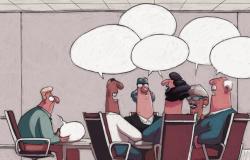bFor almost seven years he was the lobbyist for the Dutch state in the European Union. The man who negotiated hundreds of billions of euros in EU subsidies on behalf of The Hague, who prepared and refined thousands of European laws, the support and support for dozens of uncertain ministers at complex EU meetings and the man next to Prime Minister Mark Rutte at all EU summits. And yet hardly anyone outside Brussels knows Robert de Groot.
“That was also my goal,” says De Groot (62) with a decisive smile. After all, its habitat since 2017 has been the illustrious ‘Coreper’, the French abbreviation of it Permanent Committee of Representatives. Almost every day (and often at night) he met as the Dutch permanent representative with his colleagues from the other 26 EU countries in this proverbial Brussels back room. If there is one place where the homo diplomaticus – also known as the homo anonymousus – thrives well, it is there.
About the author
Marc Peeperkorn has been the EU correspondent of de Volkskrant. He lives and works in Brussels.
In February, De Groot transferred to the European Investment Bank, where he now sits on the board on behalf of the Benelux. By way of exception, he steps out of anonymity. The perfect opportunity for a portrait in ten questions of the senior EU diplomatthe code name under which EU ambassadors such as De Groot normally operate.
What does homo diplomaticus look like?
The cliché image is that of gentlemen double breasted suits and (in a minority) women in fine, expensive suits. Nonsense, says De Groot. ‘The last double breasted blazer left with the previous Spanish ambassador. The men all wear shabby gray suits.’ The average age is 55-plus. ‘These are people with 25 to 30 years of experience as diplomats. They know all the tricks, have seen it all, master the craft and have authority: here in Brussels, but also at home in their political capital.’
What does that famous Brussels back room look like?
The EU ambassadors meet in the Europa building on Brussels Wetstraat, on the fifth floor, room S5. The name is involuntarily reminiscent of S5 from the army inspection at the time, the worst score for mental stability, which resulted in you not being called up. “I didn’t succeed,” says De Groot. In the S5 room, the 27 ambassadors sit at a large oval table. Behind the seat of each ambassador are three more chairs, for national experts and advisors. “The third chair is so small that you can’t even write there,” says De Groot. A representative of the European Commission and someone from the legal service will also join us. ‘All in all, there are about a hundred people in the room.’ Around it are the booths for the interpreters and next to it is the listening room, the place for spokespersons and other involved parties. Here is the ‘editorial room’ where the quotes from the senior EU diplomats are coined. De Groot: ‘Coreper is the only meeting in Brussels that has never stopped during the corona pandemic. And we have only had a handful of infections in the room.’
Is a good lunch with European wine served at those meetings?
Absolutely not, De Groot knows. ‘That is outdated. Lunch consists of three soggy sandwiches and a glass of gravy. Those sandwiches have had the same three spreads on them for years. I still don’t know exactly what it is.’ Sometimes the chairman of the meetings – the chairmanship changes every six months – provides a surprise. ‘Then you get a bag of chips.’
What is the working method of the country’s most important diplomat?
There are different models. De Groot points to his Romanian colleague, who featured prominently on Romanian television every week to provide explanations. An impassable road for him. ‘I am known in the Dutch government, not in newspapers or on television. I am not front manI have nothing to gain from that. On the contrary, I gain from being able to enter everywhere because people know that everything remains between us.’
What works better in negotiations: whispering or fists?
De Groot looks happily at the sheet of scratchy notes he has brought with him. It turns out to be the Negotiator’s Handbook, or at least a first step towards it: the De Groot codex. ‘It’s ten points, I don’t know why, but I got exactly ten.’ The first requirement for a diplomat is a network. ‘If The Hague called me and said: ‘Robert, we have a problem’, I had to be able to call someone with a solution. That gentleman or lady must see my name on the phone screen and think: ah, De Groot, I’ll answer that. Building and maintaining such a network takes time. Every year, 20 percent of your contacts leave Brussels, so you always have to invest in getting to know new people.’
Point two: the favor factor. ‘The others must want to do something for you. That depends on a constructive attitude in the past, but also on the added value of the solution: there must be something in store for them too.’
Which automatically brings us to point three: formulate your problem with the other person in mind. ‘Just shouting ‘The Netherlands wants this’ does not work. That’s what they think: fuck off. So not: we want to be able to spread more manure two meters from the side of the ditch! No, you have to create understanding: in the Netherlands we have more than five hundred people per square kilometer, the highest population density in Europe after Malta. That is sometimes a problem, for example with the manure. What could we do? There must be a dialogue, not a monologue.’
Point four: never bluff. ‘Your colleagues need to know that you are 100 percent covered by your government. Only then you have clout. If I firmly state something and then my Prime Minister says something different during the EU summit, then… forget it, then it’s over. Then the next time my colleagues will think: oh well, it’s just Robert.’
This also follows from points five of the De Groot codex (the ambassador must enjoy confidence in his capital), point six (status at the European Commission) and (point seven) to ensure that his team (the permanent representation, that of the Netherlands employs approximately 130 people) is highly regarded. ‘The bond of trust is what diplomacy is all about.’
With so many interests and political pressure: does anyone ever get out of their way?
‘Point eight’, De Groot continues unperturbed: ‘You can be tough, at least verbally. Blunt but reliable. No tricks, especially not in a small country like the Netherlands. We are not Germany that pays a quarter of the EU budget. The Netherlands pays 5.5 percent of the budget. So we have to work harder and be smarter to get something done.”
His colleagues describe De Groot as a bit solemn, never emotional, always cool. “If they say that, it must be true,” De Groot answers. Not forgotten is how he rejected EU President Charles Michel’s plan for a large European investment fund. ‘Karl Marx on steroids, De Groot described this plan in confidential consultations with his colleagues, a quote that was immediately leaked. An example of hard but efficient operation, according to De Groot. ‘The instruction from The Hague was: we don’t want this. Then you see a number of ambassadors shouting: a new pot of money, fantastic, bring it on! My German colleague didn’t say yes or no, we had to think about it again. Then I thought: soon everyone will write down that we are taking it seriously. Then there has to be someone who shouts very loudly: ‘NO, we are not going to do that.’ That was me, very blunt.’ De Groot denies that he received applause for it, as his colleagues claim. ‘You only get applause when you leave. But the fund never materialized.’
Which illustrates point nine: the timing of when you say something. ‘You can ask to speak first to set the tone. You can wait your turn if the topic is not of great importance. Or agree with your colleagues that you will be the last to further emphasize your position. That’s what I did at that investment fund: Marx on growth hormones.’
Finally, point ten: the ambassador is also very active outside the formalized consultations with his EU colleagues. He has to organize and attend informal dinners with key colleagues, go to receptions, meet lobbyists, attend seminars, whisper ideas to think tanks, and speak to the national and international press. The Brussels circles are wider than the Schumanplein around which the European institutions are centered. Or as De Groot puts it: ‘The Rolodex must be completely full.’
What is the working week of a top ambassador?
“Well, seven days, times 24 hours, minus some sleep.”
What was your biggest defeat and what was your biggest victory?
De Groot smiles. ‘There are 27 of us. Winning by double figures is not possible, then there will be no more European cooperation. The next day you have to continue together, so it is always 2-1 in the 90th minute, German style.’
Almost the entire House of Representatives complains about too many Brussels rules. These are prepared by the ambassadors: do these diplomats suffer from a tendency to regulate?
The Netherlands, says De Groot, is a small country with an open economy. Companies are busy every day with the import and export of goods. ‘Then only one thing is important for entrepreneurs: predictability. That means fair competition, in other words: rules. All those thousands of lobbyists here in Brussels are working on more rules, not fewer.’
The regulatory burden is a problem: the accumulation of inconsistent rules. The Commission has a blind spot for this, says De Groot. Just like what national governments can handle. ‘It is a bizarre system: before a country joins the EU, it receives all the help to make the civil service effective. Once a member, the message is: figure it out.’
The Netherlands may have a Eurosceptic government. Will your successor become best friends with his Hungarian colleague?
De Groot shakes his head. ‘I cannot imagine that we will have a government that says: Europe has been enough. In this day and age, with these dangers, with China, with Russia, with climate and energy, that is simply not possible. After Brexit, Europeans have recovered from this. The Netherlands is always critical in Europe, and rightly so. We always want things just a little bit better and different. I also do not exactly have the impression that the European Commission regards the Netherlands as naive. But at the end of the negotiation, bottom line, the result is always worth it.’
Tags: Homo diplomaticus diplomats background European Union running
-





